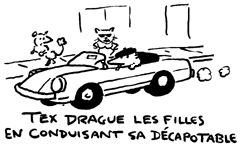The present participle is formed by dropping the -ons ending from the nous form in the present tense
and adding -ant. Present participles are invariable.

 |
| regular formation |
| chanter (nous chantons) |
|
chantant |
| finir (nous finissons) |
|
finissant |
| lire (nous lisons) |
|
lisant |
| boire (nous buvons) |
|
buvant
|
| suivre (nous suivons) |
|
suivant |
| commencer (nous commençons) |
|
commençant |
| manger (nous mangeons) |
|
mangeant |
| se laver (nous nous lavons) |
|
se lavant |
|

Only three verbs, être, avoir and savoir, have irregular present participles.

 |
| irregular present participles |
| être:étant |
| avoir: ayant |
| savoir: sachant
|
|

The present participle can be used to modify a noun, similar in meaning to either a relative clause with qui + conjugated verb or a relative clause with puisque.

 |
Tex: Les tatous ayant une voiture ont beaucoup de succès avec les filles.
(Les tatous qui ont une voiture ont beaucoup de succès avec les filles.) |
|
Armadillos who have a car are very successful with girls. |
| Tex: Tammy étant absente, je peux t'emmener faire une balade envoiture, Bette. |
|
Since Tammy is not here, I can take you on a ride in my car, Bette. |
| (Puisque Tammy est absente, je peux t'emmener faire une balade en voiture, Bette.)
| |
|
|

 En + present participle,
commonly known as the gerund form, is used to indicate that two actions are simultaneously performed by the same subject.
This corresponds to the English 'while', 'upon', or 'by'. En + present participle,
commonly known as the gerund form, is used to indicate that two actions are simultaneously performed by the same subject.
This corresponds to the English 'while', 'upon', or 'by'.

 |
 |
| Tex drague les filles en conduisant sa décapotable. |
|
Tex hits on girls by driving his convertible.
|
| Tex conduit en écoutant la radio. |
|
Tex drives while listening to the radio.
|
|

Tout en + present participle is used to stress that two actions are simultaneous (and sometimes contradictory).
Remember to make the liaison between tout and en.

 |
| Tex siffle tout en conduisant. |
|
Tex whistles and drives at the same time. |
| Tex drague Bette tout en pensant à Tammy. |
|
Tex hits on Bette, all the while thinking of Tammy. |
|

Note that the English -ing forms are usually translated by an infinitive
construction in French rather than a present participle. For example:

 |
| Before coming to Texas, Tex did not like kitties. |
|
Avant de venir au Texas, Tex n'aimait pas les minettes. |
| But Tex is changing his mind. |
|
Mais Tex est en train de changer d'avis. |
|


|
 En + present participle,
commonly known as the gerund form, is used to indicate that two actions are simultaneously performed by the same subject.
This corresponds to the English 'while', 'upon', or 'by'.
En + present participle,
commonly known as the gerund form, is used to indicate that two actions are simultaneously performed by the same subject.
This corresponds to the English 'while', 'upon', or 'by'.
